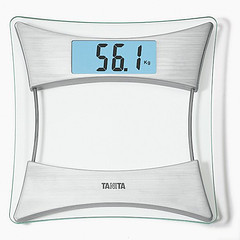Body composition scales are common in our bathrooms and most people use them for calculating body fat percentage, but just how accurate are these scales?

In this article we take a look at body fat scales, also known as bio-impedance scales and decide whether or not you should use them to estimate your body fat percentage.
Body Composition Scales At A Glance
Bio-impedance Scales
Equipment: Bio-Impedance Scales
Skill: Little to none
Cost: Cheap ($20 – $60)
Accuracy: Relatively accurate
Rating: 3/5
How Do Body Composition Scales Work?
Body composition scales are just like regular bathroom scales except they give you additional information such as:
- Body Fat %
- Visceral Fat % (this is the dangerous fat around your organs)
- Lean Body Mass (e.g. muscle mass)
- Bone Density
- Hydration Levels
You stand on these scales (sometimes holding handles attached by cables) and they weigh you and provide an estimate of body fat and other readings.
They work by sending an electrical current through your body (you don’t feel anything and its 100% safe), the test calculates how long the current took to go through your body,
How Do You Test Body Fat Using Body Fat Scales?
Most body fat scales have you start the test by entering your age, height and weight.
You then stand on the scales and grab the handles if there are some and remain still while the numbers get crunched.
The scales usually beep to let you know the test is complete and it then provides a summary of the results. It’s worth having a pen and paper handy to write these down, even better a notebook that you log all of your readings in so you can compare them side-by-side.
How Accurate Are Body Composition Scales?
Body fat scales are known to be inaccurate and whilst they’re far from perfect, technology has improved their accuracy greatly over the last 10 years.
It’s fair to assume that the more expensive the scales the more accurate they’ll be but this isn’t always the case so I don’t recommend you go for the top of the range scales.
Stick to a known brand such as Tanita and read the reviews on Amazon to see which scales have good reviews from users.
Beware! Hydration Affects Body Fat Results
One point I should bring to your attention is the fact that your hydration levels can influence the readings a scale gives you.
The electrical current runs through your body and calculates how much water you have in your body and from that estimates your body fat, muscle mass, bone density levels etc.
Being dehydrated (or too hydrated for that matter) changes the results as the hydration level influences everything else.
I’ve had a test after drinking a litre of water and compared it to a test a few days later and the difference was a few percent different. Had I gained 2-3% body fat? No…my hydration levels impacted the results.
I’ve also been tested the day after a night of drinking and debauchery and as I was dehydrated from all the alcohol my reading was vastly different from the previous weeks reading.
My bodyfat level hadn’t changed drastically in the space of a week so my hydration was the variable.
For this reason, the only way to ensure accurate readings using this method is to always keep constant the conditions under which you are tested.
Try to keep the same routine so you’re not drinking alcohol the day before (and dehydrating yourself) or not drinking more water than usual.
Take a pee before testing and don’t eat anything or do any exercise. Try to test yourself on the same day too, this will help keep variables to a minimum and keep your results accurate.
Bottom Line
Not the most accurate method of body composition tracking but assessable, cheap and if testing conditions are kept consistent a good enough tool to track your progress.
Top Rated Body Composition Scales
Return from Body Composition Scales to Free Online Diet Plans Tools
Return to Free Workout Plans For Busy People